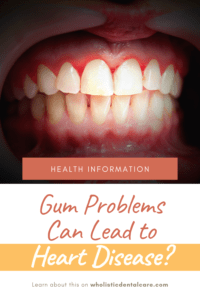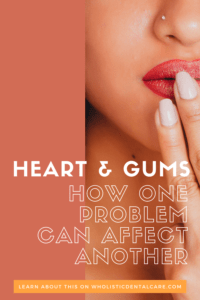 When you first take a moment to think about your teeth and mouth in general, the heart may not be the thing that you would correlate to it. But for some time now, research has been suggesting that they are more related than they seem.
When you first take a moment to think about your teeth and mouth in general, the heart may not be the thing that you would correlate to it. But for some time now, research has been suggesting that they are more related than they seem.
But wait, let’s backtrack a bit first and lay down some terms before talking more about research.
What is periodontal disease? According to the American Academy of Periodontology, periodontal disease is an inflammatory disease that affects the soft and hard tissues that support our teeth. For the regular person, it would suffice to basically know that there are two main stages of periodontal disease- gingivitis and periodontitis.
In its early and less damaging stage, periodontal disease is called “gingivitis.” In this stage, your gums would appear red and swollen- indicative of inflammation wherein your body is trying to fight off the bacteria adhered to plaque. Plaque is the sticky white substance you get on your teeth when you forget to brush your teeth for some time.
For “periodontitis,” this is where things get a little more destructive and permanent. The supporting tissues of your teeth start to sort of “pull away” from the teeth and as a result, your tooth’s support structure is significantly less than before. Gum and bone over time would lessen their envelopment of the tooth, and the tooth may in turn be lost in a matter of time.
Data from the Centers for Disease Control and Prevention from way back in 2012 reported that one in every two Americans aged 30 and up have some form of periodontal disease.
So, How Are They Related?
 Let’s now go back to the topic- how are these two different health problems related?
Let’s now go back to the topic- how are these two different health problems related?
For some years now, research has concluded that there is a correlation between periodontal disease and cardiovascular disease (or CVD). They’ve mainly looked at inflammation as the “prime suspect” of how the two are interrelated. You see, an increasing body of evidence shows that periodontal disease such as periodontitis can add more to the inflammation process of CVD.
One theory assumes that the process starts from the bacteria found in plaque. They’ve found that these bacteria can also be seen in the fatty deposits in atherosclerotic blood vessels located far away from your mouth. So basically, these bacteria can travel and remnants are found around blood vessels. But it isn’t the bacteria itself that causes the increased risk, it’s the reaction of your body to these bacteria that sets off a cascade of damage around your body’s blood vessels.
But other data also points out that there may not be a direct effect at all for all of these. Rather, contributory factors may be the reason for the association, such as smoking, lack of exercise, or lack of access to healthcare.
But even as we wait for more conclusive and direct evidence, it is still in everyone’s best interest to prevent these problems at all from occurring. Or at the very least, avoid pre existing periodontal and heart problems from worsening.
Prevention of Gum Disease
 Prevention is better than cure! This rings true for everything health-related. So how do we start? First, make sure to practice good oral hygiene. Brushing and flossing properly are vital to maintaining oral health. Some warning signs of the early stages of periodontal disease that you can watch out for are:
Prevention is better than cure! This rings true for everything health-related. So how do we start? First, make sure to practice good oral hygiene. Brushing and flossing properly are vital to maintaining oral health. Some warning signs of the early stages of periodontal disease that you can watch out for are:
- Bleeding while cleaning your teeth (brushing and flossing)
- Red, inflamed gums that look bigger than normal
- Receding gums that are starting to form “black triangles’
- Teeth that are loose and mobile
- Bad breath that persists with constant mouth cleaning
Even if you do make sure to brush and clean your teeth regularly, it is still important to visit your dentist for professional cleaning and maintenance services. This is because there are still areas around the teeth that we may neglect or might not reach properly. Aside from performing a thorough cleaning, your dentist will be able to assess and advise you on whether you brush enough or if you’re doing it properly. The dental health professional will also be able to approach treatment holistically and help you manage your periodontal disease, as well as explain to you in detail the rationale and repercussions of not taking the time to clean your teeth.
Prevention of Heart Disease
Basically, you can prevent or lower your risk for heart disease and it’s sequelae by consciously living a healthy lifestyle. In a nutshell, you should:
- Maintain a diet of good vegetables and protein
- Lessen junk food
- Monitor and maintain the ideal weight/ BMI
- Exercise daily/ take up an exercise routine
For pre-existing medical conditions, it is imperative that you monitor your condition. Being aware of your current status can give you a better idea of what you should do. Some things you could do are:
- Undergo tests for cholesterol, even more so if you’re at high risk for it
- (If you have diabetes) Manage your diabetes. Monitor your glucose levels and take your prescribed medications as indicated by your doctor.
- Take your prescription medications for other systemic illness that you may have
- Cooperate with all of your health care providers. An interdisciplinary approach to health is important for people who have or at risk for having systemic diseases.
Resources:
https://www.perio.org/consumer/cdc-study.htm




Leave A Comment
You must be logged in to post a comment.